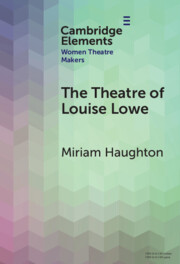Refine search
Actions for selected content:
6 results
Chapter 30 - The Fornésian Tradition
- from Part IV - Legacy
-
-
- Book:
- María Irene Fornés In Context
- Published online:
- 27 August 2025
- Print publication:
- 07 August 2025, pp 346-356
-
- Chapter
- Export citation
Climate Futures at Play: Performing Environmental Public Humanities
- Part of
-
- Journal:
- Public Humanities / Volume 1 / 2025
- Published online by Cambridge University Press:
- 15 April 2025, e87
-
- Article
-
- You have access
- Open access
- HTML
- Export citation

The Theatre of Louise Lowe
-
- Published online:
- 24 February 2025
- Print publication:
- 27 March 2025
-
- Element
-
- You have access
- Open access
- HTML
- Export citation
Chapter 5 - Fame and Famine
-
- Book:
- The Business of English Restoration Theatre, 1660–1700
- Published online:
- 18 October 2024
- Print publication:
- 13 June 2024, pp 166-213
-
- Chapter
-
- You have access
- Open access
- HTML
- Export citation
Chapter 1 - Playwrights
- from Part I - Theatre Makers
-
-
- Book:
- The Cambridge Companion to British Theatre since 1945
- Published online:
- 14 March 2024
- Print publication:
- 21 March 2024, pp 23-41
-
- Chapter
- Export citation
Coda: Tom Murphy and Brian Friel
- from Part II - Spaces
-
-
- Book:
- Irish Literature in Transition: 1980–2020
- Published online:
- 28 February 2020
- Print publication:
- 12 March 2020, pp 201-208
-
- Chapter
- Export citation
